
Aldo Bini was an Italian road bicycle racer. He won several one-day races, as well as four stages of Giro d'Italia in 1936–1937. He placed second at the 1936 World Championships and 48th in the 1938 Tour de France.

Olimpio Bizzi was an Italian racing cyclist, who won 13 stages of Giro d'Italia in 1936–1946, as well as the 1950 Tour du Maroc. He rode the 1947 Tour de France, and placed sixth in the 1947 Paris–Roubaix.

Legnano was an Italian professional cycling team active from 1906 to 1966. It is ranked as the 6th most successful cycling team in history. Many famous cyclists rode for the team including Alfredo Binda, Learco Guerra, Gino Bartali and Fausto Coppi. The team participated in the Giro d'Italia 46 times, won the team classification 11 times and earned 135 stage wins. It was sponsored by Italian bicycle motorcycle manufacturer Legnano.

Carpano was an Italian professional cycling team that existed from 1956 to 1966. The team's main sponsor between 1956 and 1964 was the Turin-based wine company Carpano, with Fausto Coppi's bicycle company Coppi a co-sponsor for the first two seasons. When Carpano took sole sponsorship of the team, the team adopted black and white striped jerseys similar to the shirts worn by Turin's Juventus Football Club. For the final two years, 1965 and 1966, Italian food producer Sanson took over the sponsorship. Whilst with Carpano, Franco Balmamion won the general classification of the Giro d'Italia in 1962 and 1963.

Salvarani was an Italian professional cycling team that existed from 1963 to 1972. The team was sponsored by the Italian kitchen components maker Salvarani.

Filotex was an Italian professional cycling team that existed from 1963 to 1980. The teams main sponsor from 1976 to 1980 was Italian food producer Sanson.

Ferretti was an Italian professional cycling team that existed from 1969 to 1972. It was sponsored by the Ferretti kitchen company, based in Capannoli. Gösta Pettersson won the general classification of the 1971 Giro d'Italia with the team.
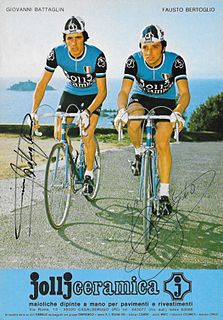
Jollj Ceramica was an Italian professional cycling team that existed from 1973 to 1977. Fausto Bertoglio won the general classification of the 1975 Giro d'Italia with team.
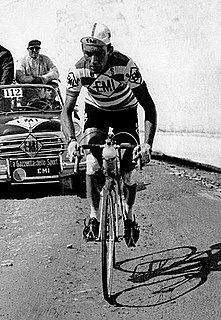
EMI was an Italian professional cycling team that existed from 1959 to 1961. In 1961, the team was renamed to VOV, and the Faema team changed its name to EMI for the 1961 Giro d'Italia. Charly Gaul won the general classification of the 1959 Giro d'Italia with the team.

Frejus was an Italian professional cycling team that existed from 1935 to 1956. Its main sponsor was the Italian bicycle manufacturer Frejus. Whilst with Frejus, Giovanni Valetti won the general classification of the Giro d'Italia in 1938 and 1939.

Guerra was an Italian professional cycling team that existed from 1949 to 1954. Whilst with Guerra, Hugo Koblet won the general classification of the 1950 Giro d'Italia.
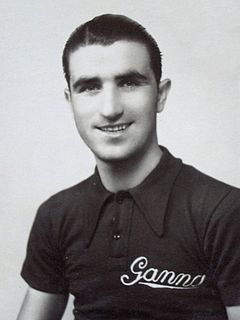
Ganna was an Italian professional cycling team that existed in part between 1913 and 1953. It was started by Luigi Ganna, winner of the general classification of the inaugural Giro d'Italia, and was sponsored by his bicycle and motorcycle manufacturing company. Whilst with the team, Fiorenzo Magni won the general classification of the 1951 Giro d'Italia. The team was the predecessor of the Nivea–Fuchs team.
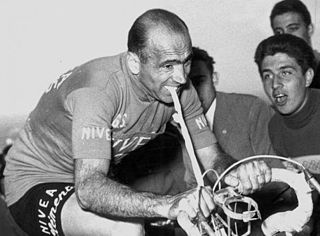
Nivea–Fuchs was an Italian professional cycling team that existed from 1954 to 1956. The team was formed when the Ganna team told its leader, Fiorenzo Magni, that it would not be able to continue and he gained the backing of the German cosmetics company Nivea to be the main sponsor of a new team. It was the first non-bicycle industry company team sponsor. Magni won the general classification of the 1955 Giro d'Italia with the team.
Wilier Triestina was an Italian professional cycling team that existed from 1946 to 1951. It was sponsored by Italian bicycle manufacturer Wilier Triestina. Fiorenzo Magni won the general classification of the 1948 Giro d'Italia with the team.

Stucchi was an Italian professional cycling team that existed in part between 1909 and 1951. Its main sponsor was Italian company Stucchi & Co. The team had two riders that won the general classification of the Giro d'Italia, Alfonso Calzolari in 1914 and Costante Girardengo in 1919.
Wolsit was an Italian professional cycling team that existed in part between 1910 and 1938. Its main sponsor was Italian bicycle manufacturer Wolsit. The team had two riders that won the general classification of the Giro d'Italia, Alfredo Binda in 1928 and Antonio Pesenti in 1932.
Gloria was an Italian professional cycling team that existed in part between 1927 and 1943. Its main sponsor was Italian bicycle manufacturer Gloria. Francesco Camusso won the general classification of the 1931 Giro d'Italia with the team.

Fides was an Italian professional cycling team that existed in 1961. Arnaldo Pambianco won the general classification of the 1961 Giro d'Italia with the team.
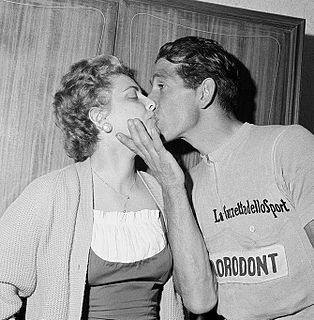
Leo–Chlorodont was an Italian professional cycling team that existed from 1955 to 1958. Its sponsors were Italian hand cream Leo and German toothpaste Chlorodont. Gastone Nencini won the general classification of the 1957 Giro d'Italia with the team.


















